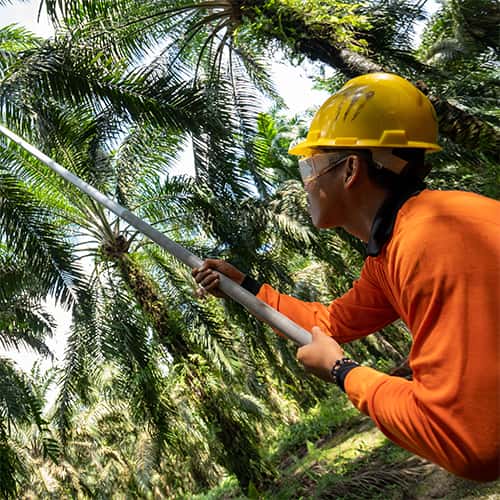RSPO Members represent every stage of the palm oil supply chain across the world’s leading oil palm-producing countries and regions. As key drivers of RSPO policies and decisions, they play a vital role in driving our shared vision of a global partnership for sustainable palm oil.
Organisations belonging to one of the seven stakeholder groups can join the RSPO. These include – oil palm producers, palm oil processors and/or traders, consumer goods manufacturers, retailers, banks/investors, environmental/nature conservation non-governmental organisations (NGOs), and social/developmental NGOs.
RSPO Members subscribe to the organisation’s mission and principles, which include:
- Commitment to transparency;
- Environmental responsibility and conservation of natural resources and biodiversity;
- Responsible consideration of employees, smallholders, and other individuals and communities affected by growers and mills; and
- Responsible development of new plantings.
These principles are enshrined in the Shared Responsibility framework – a set of responsibilities embraced by RSPO Members towards achieving RSPO’s vision of sustainable market transformation.
Along this line, RSPO Members adhere to the RSPO Code of Conduct that requires all members to work proactively towards the production and promotion of sustainable palm oil. Breaching the Code of Conduct can ultimately result in cancellation of membership.
Do I need to be an RSPO Member to use sustainable palm oil?
You do not need to be an RSPO Member to source RSPO Certified Sustainable Palm Oil (CSPO). Only RSPO Members are allowed to claim the production and/or use of RSPO CSPO.
For a company to claim it is using or sourcing RSPO CSPO, all actors throughout the supply chain (producers, refiners, processors, traders, distributors and manufacturers) need to be RSPO Members and RSPO Certified. This is required in order to be able to track the flow of sustainable palm oil throughout the supply chain. Some companies such as retailers, traders, and distributors that do not manufacture, blend, pack, relabel, or repack palm oil and its by-products, are exempt from certification.
RSPO encourages all parties in the palm oil supply chain to become a member. This enables all organisations involved in the production, sourcing, and use of RSPO CSPO to publicly communicate about their commitment and show the entire industry that sustainable palm oil is the only way forward.

Becoming an RSPO Member and being RSPO Certified. What’s the difference?
Becoming an RSPO Member demonstrates a positive commitment and effort toward promoting and supporting sustainable palm oil. Becoming an RSPO member is only the first step. There is a significant difference between being an RSPO Member and being an RSPO Certified Member.
An RSPO Certified Member means the company has undergone a certification audit on compliance to the RSPO Standards and can make public claims on the production and/or use of CSPO. These standards include RSPO Principles and Criteria 2018 (P&C), 2020 RSPO Supply Chain Certification Standard or 2019 RSPO Independent Smallholder (ISH) Standard.
Photo Credit: RSPO/PT. BGA